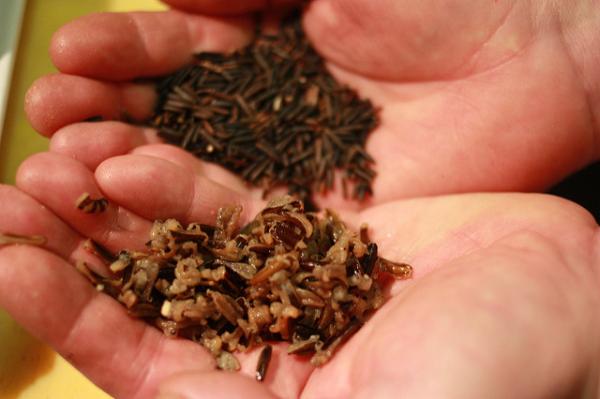One of the indigenous tribes of Canada and the US, the Ojibwe or perhaps you know them as the Chippewa, made a bit of legal history, passing a law formally recognizing the Rights of Manoomin – wild rice. It was an affirmation of the rights of nature a legal “theory” rooted in the Endangered Species Act.
Wild rice is part of the Ojibwe’s origin story, following “a shell in the sky thousands of years ago to find a place where food grows on water;” to the Great Lakes basin where they found wild rice, North America’s only native grain. It was necessary, as a primary food source and for the surrounding waterfowl, becoming culturally entangled in their medicine and spiritual ceremonies. Near the end of 2018, the White Earth band of the Ojibwe determined that Manoomin had
“The right to clean water and freshwater habitat, the right to a natural environment free from industrial pollution, the right to a healthy, stable climate free from human-caused climate change impacts, the right to be free from patenting, the right to be free from contamination by genetically engineered organisms.”
Protection of the environment is the old fight over the equitable use of “the commons.” To what degree do we constrain individual interests for the greater good of the public? Initially, arguments were grounded in religion or morality. Our constitution makes religious arguments problematic prohibiting government interference or support of religious activity, so frequently the argument is couched in moral terms.
Conservationists argue the idea of “greater good” has a more pragmatic bias; the greatest good, for the greatest number, for the greatest time. Conservation argues for lumbering and hunting. Preservationists, like John Muir or the Sierra Club, employ no calculus of usefulness, the environment is preserved for its intrinsic value, “inspiring to the human spirit.” The thoughtful reader may recognize a deeper argument evidenced by conservation and preservation. Conservation and utility lie in the camp of the wizards, technological optimists; preservation takes root with the prophets, cautioning our hubris. [1]
Many special interests claim moral authority, requiring their needs to be preferred over worldly measures like economics. “But in a political world where virtually every claim is presented as moral, there can be no moral high ground. Political savvy and power, not claims of moral superiority, will govern the use and nonuse of nature.”
The source of political savvy, “rights;” a powerful legal construction with a long history of revolutionary and incremental change. Rights are powerful, elevating and guaranteeing a protected interest above the political fray. That is one reason you find many of our unresolved arguments couched in terms of rights, the right to bear arms, reproductive rights, and now a growing desire for environmental rights.
The Endangered Species Act strictly prohibits Federal actions that endanger a species. It does not permit cost-benefit analysis or impact considerations – if a species is endangered, irrespective of its practical value, the action is prohibited. But to preserve a species you must also protect their environment, so over time, the focus has expanded. The environment is more encompassing, with both organic components, plants and animals, and inorganics, mountains, rivers, and now more frequently, climate. But whether couched in terms of species or environment the argument returns to conservation or preservation; after all, neither species nor the environment can speak for themselves. We do.
The true measure is the importance we place on the environment. The Ojibwe’s decision was based on the importance of wild rice to their culture. “To recognize right in natural living organisms is to recognize right in those who care about those organisms.” Put in these terms, the decision by the Ojibwe is no different than the claims of Cliven Bundy in his standoff with the Federal government over grazing fees – a question of preserving a “lifestyle.”
Our societal behavior, codified in law and regulation, is based first and foremost on protecting human interests; who would place us lower than first on the list of things to protect? Human values are always first; the argument is over which values. Believing the prophets, that the cost of destroying nature is always greater than the benefits argues against vaccines and antibiotics. Believing the wizards, that technologic change is always better, argues that our increasing loss of privacy is inconsequential. Neither the wizards or prophets are inherently correct irrespective of how we cloak our arguments, in science, rights or morality, there will always be tradeoffs.
[1] The analogy was stolen from Charles Mann’s excellent book on Norman Borlaug and William Vogt, The Wizard and the Prophet.
Sources: First was this report, The Rights of Wild Rice which lead me to a deeper look both at wild rice, Manoomin: The Taming of Wild Rice in the Great Lakes Region and the Rights of Nature in this legal brief from the University of Montana.



